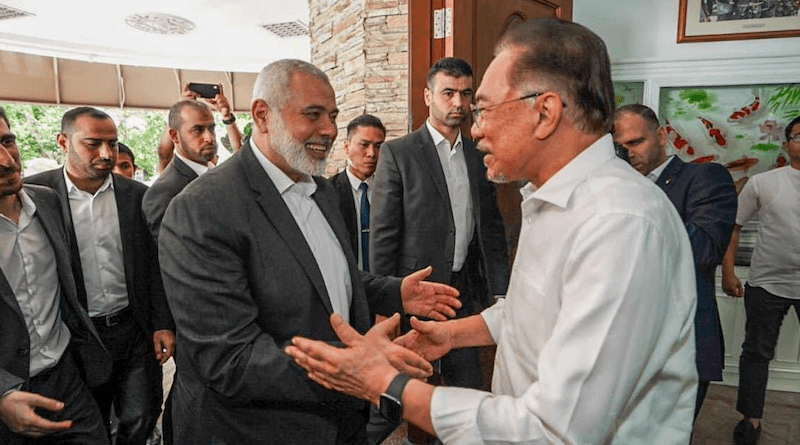Reckoning For Malaysia? Unexpected Connection Between A Moderate Muslim Nation And Hamas’ Deadly Tactics – OpEd
By Mark Haddad
Nestled between Thailand and Singapore, Malaysia, with its pristine beaches and rich cultural heritage, often conjures up images of tourism, culinary delights, and a harmonious blend of traditional and modern lifestyles. However, recent revelations have thrust this Southeast Asian nation into a realm of international intrigue and suspicion. The world now turns a critical eye towards Malaysia, grappling with the startling possibility that this seemingly moderate Muslim-majority nation played a role in training Hamas operatives for a brazen attack on Israeli territory.
Earlier this month, the world watched in astonishment as Hamas terrorists took to the skies, employing paragliders to infiltrate Israeli borders. This infiltration method, alarmingly distinct from the group’s usual tactics, raised international eyebrows and inevitably led to inquiries about the origins of such expertise.
The Israeli Defense Forces (IDF), in their subsequent investigation, revealed a connection that many would have deemed improbable: the Hamas cell responsible had reportedly received their advanced training in Malaysia. This allegation becomes particularly thorny when juxtaposed with Malaysia’s staunch denial of any prior association or involvement with Hamas operatives.
For decades, Malaysia’s position on the Israel-Palestine conflict has been unequivocal yet non-aggressive. Its support for the Palestinian cause is well-documented, but it has traditionally remained detached from any direct involvement in the hostilities of the Middle East. Should the IDF’s allegations stand up to scrutiny, Malaysia’s perceived stance of passive diplomacy would be shattered, giving way to a narrative of active, covert engagement in facilitating terrorism.
As the news of this alleged connection trickles through international diplomatic channels, a wave of disbelief and concern engulfs the global community. If a nation, often cited as an exemplar of progressive Islam and moderation, could be entangled in such a web, what does it imply for the covert operations of extremist organizations worldwide?
It is essential to consider the broader implications of such an association. Malaysia’s globally recognized brand as a tourist hotspot, a burgeoning economy, and a stable political entity could be jeopardized. Potential diplomatic fallout could see strained ties with nations that have traditionally been allies or neutral observers. Economically, sanctions or trade restrictions could deal a blow to Malaysia’s aspirations of becoming a developed nation by the end of the decade.
But beyond these immediate potential repercussions lies a more profound, existential dilemma for Malaysia: a crisis of identity. For years, Malaysia has projected itself as a nation where Islam’s tenets coexist with economic progress and modernity. This alleged association with Hamas threatens to upend this delicate balance, raising questions about the nation’s true stance on extremism and terrorism.
The gravity of these allegations also sends ripples through the international diplomatic community. It underscores the pressing need for countries, regardless of their size or influence, to exercise vigilance and ensure that their territories and resources aren’t exploited by entities with malevolent intentions. For nations that pride themselves on their neutrality or moderation, this serves as a wake-up call to introspect and reinforce safeguards against external exploitations.
Within Malaysia, the news has the potential to become a polarizing issue. While a segment of the population, driven by religious and ideological leanings, might view support for Hamas as justifiable, another, more liberal and globally connected segment, would likely express outrage and demand accountability from the powers responsible. This internal chasm could shape Malaysian politics and society for years to come.
As the world waits for conclusive evidence and clarity on this issue, it’s worth noting that the landscape of terrorism and extremist tactics is in constant flux. Organizations like Hamas are perpetually seeking avenues to enhance their operational capabilities. The alleged Malaysia-Hamas link is a sobering reminder of the lengths to which such groups might go and the unsuspecting locales they might turn to in their quest for supremacy.
In conclusion, Malaysia stands at a crucial juncture, with its reputation and future diplomatic relations hanging in the balance. While the truth of its involvement remains shrouded in uncertainty, the mere association has already cast a long shadow over the nation’s global image. Whether Malaysia emerges from this controversy vindicated or vilified, this episode will undoubtedly serve as a lesson for nations worldwide about the perils of complacency and the importance of perpetual vigilance in our increasingly interconnected world.

